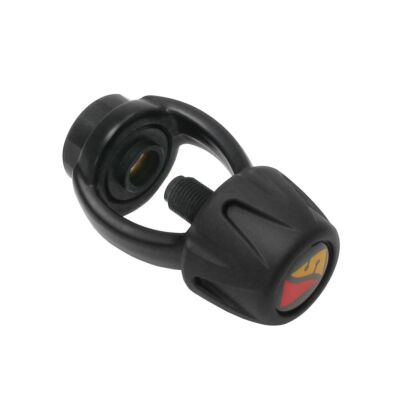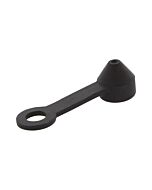Dive Rite DIN-to-Yoke Spin-On Adapter
- Genuine Dive Rite branded DIN-to-Yoke Adapter
- Connect any 200 Bar or 300 Bar DIN first stage to a yoke-type cylinder K-valve
- Just spin-on to first stage DIN fitting, no tools required
- Chromed brass construction with black finish matching current Dive Rite first stages
Dive Rite DIN-to-Yoke Spin-On Adapter
Use this spin-on adapter to connect any DIN fitting on a yoke-type cylinder valve. This Dive Rite brand DIN-to-yoke spin-on adapter is marine grade black chrome plated brass construction suitable for use with any yoke (aka A-Clamp) type CGA-850 standard K-valve and steel or aluminum SCUBA cylinder up to {3442 psi | 232 bar} service pressure.
The black finish matches the current line of Dive Rite regulators.
| Brand | Dive Rite |
|---|---|
| SKU | DR-RG1225BLK |
| Weight | 1.000000 |
Customer Reviews
Dust caps with DIN-to-Yoke adapters are not best practice
You should use a yoke dust cap with native yoke fitting first stages, but you do not need to use a dust cap with DIN-to-Yoke spin-on adapters. Although some adapters include them, you should NOT permanently leave a DIN-to-Yoke adapter in place and cap the adapter. Leaving the adapter permanently on the DIN fitting can eventually cause the DIN fitting to 'lock-in' to the yoke adapter, making it impossible to remove without damaging something.
Best practice for use of all DIN-to-Yoke adapters is to first mount and tighten the adapter to the tank K-valve, then attach the DIN regulator to the adapter. After your dive, first remove the DIN regulator from the adapter, place a dust cap the DIN fitting and then remove the adapter from the tank K-valve. Thus, by following best practice there is no need for yoke dust cap and our generic DIN-to-Yoke adapters don't include a cap. If you are new to DIN fittings on regulators, you might read our Uncoupling DIN Fittings from SCUBA Valves TekTip.
Regardless of Yoke or DIN, do not leave the dust cap attached to the fitting during the dive. Although convenient, unfortunately either the diver fails to dry it off when replacing thus trapping moisture in the regulator inlet, or worse, novices will dry the cap with a blast of compressed gas from the tank valve. The problem with that (as our service techs often complain) is the blast of gas will often blow moisture from the valve face or the attached cap right in to the first stage inlet. When the dust cap is not in use, store it in a dry place.


